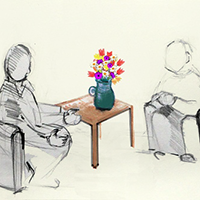Empathy as core to the development of holding and recognition: the case of Garret

Submitted: March 16, 2020
Accepted: June 13, 2020
Published: September 18, 2020
Accepted: June 13, 2020
Abstract Views: 1346
PDF: 665
HTML: 28
HTML: 28
Publisher's note
All claims expressed in this article are solely those of the authors and do not necessarily represent those of their affiliated organizations, or those of the publisher, the editors and the reviewers. Any product that may be evaluated in this article or claim that may be made by its manufacturer is not guaranteed or endorsed by the publisher.
All claims expressed in this article are solely those of the authors and do not necessarily represent those of their affiliated organizations, or those of the publisher, the editors and the reviewers. Any product that may be evaluated in this article or claim that may be made by its manufacturer is not guaranteed or endorsed by the publisher.
Similar Articles
- Stefania Cella, Annarosa Cipriano, Mara Iannaccone, Paolo Cotrufo, Identifying predictors associated with the severity of eating concerns in females with eating disorders , Research in Psychotherapy: Psychopathology, Process and Outcome: Vol. 20 No. 1 (2017)
- Mariagrazia Di Giuseppe, Katie Aafjes-van Doorn, Vera Békés, Bernard S. Gorman, Karl Stukenberg, Sherwood Waldron, Therapists’ defense use impacts their patients’ defensive functioning: a systematic case study , Research in Psychotherapy: Psychopathology, Process and Outcome: Vol. 27 No. 2 (2024)
- Benedetto Farina, Marianna Liotti, Claudio Imperatori, Lucia Tombolini, Elena Gasperini, Paola Mallozzi, Marianna Russo, Giorgia Simoncini Malucelli, Fabio Monticelli, Cooperation within the therapeutic relationship improves metacognitive functioning: preliminary findings , Research in Psychotherapy: Psychopathology, Process and Outcome: Vol. 26 No. 3 (2023)
- Tomáš Řiháček, Jan Roubal, Katarína Motalová, Facets of the psychotherapy relationship: a metaphorical approach , Research in Psychotherapy: Psychopathology, Process and Outcome: Vol. 23 No. 3 (2020)
- Adam Klocek, Tomáš Řiháček, The associations between interoceptive awareness, emotion regulation, acceptance, and well-being in patients receiving multicomponent treatment: a dynamic panel network model , Research in Psychotherapy: Psychopathology, Process and Outcome: Vol. 26 No. 2 (2023)
- Sara Silva, Isabel Basto, João Salgado, Carla Cunha, Validation of the client satisfaction questionnaire: a pilot psychometric analysis in Portuguese routine practice , Research in Psychotherapy: Psychopathology, Process and Outcome: Vol. 26 No. 2 (2023)
- Catalina Sieverson, Marcia Olhaberry, Javiera Duarte, Javier Morán-Kneer, Stefanella Costa, M. José León, Sofía Valenzuela, Fanny Leyton, Carolina Honorato, Antonia Muzard, Beyond the outcomes: generic change indicators in a video-feedback intervention with a depressed mother and her baby: a single case study , Research in Psychotherapy: Psychopathology, Process and Outcome: Vol. 25 No. 1 (2022)
- Pedro Rodrigues Ribeiro, David Dias Neto, The real relationship: the Portuguese version of the Real Relationship Inventory-Client form , Research in Psychotherapy: Psychopathology, Process and Outcome: Vol. 26 No. 2 (2023)
- Alice Fiorini Bincoletto, Ludovica Zanini, Grazia Fernanda Spitoni, Vittorio Lingiardi, Negative and positive ageism in an Italian sample: how ageist beliefs relate to epistemic trust, psychological distress, and well-being , Research in Psychotherapy: Psychopathology, Process and Outcome: Vol. 26 No. 2 (2023)
- Francesco Gazzillo, Adriano Schimmenti, Ivan Formica, Alessandra Simonelli, Sergio Salvatore, Effectiveness is the gold standard of clinical research , Research in Psychotherapy: Psychopathology, Process and Outcome: Vol. 20 No. 2 (2017)
<< < 4 5 6 7 8 9 10 11 12 13 > >>
You may also start an advanced similarity search for this article.

 https://doi.org/10.4081/ripppo.2020.457
https://doi.org/10.4081/ripppo.2020.457




